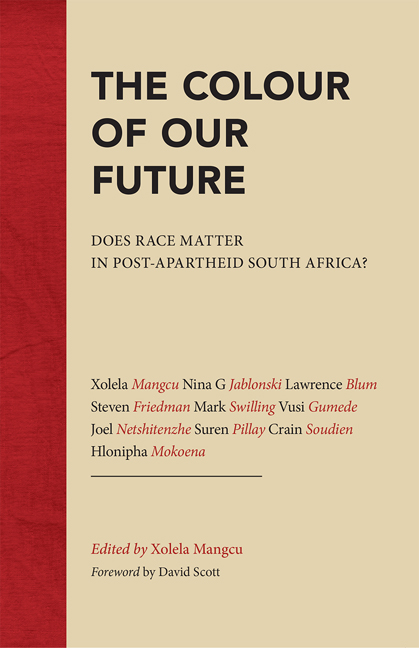Book contents
- Frontmatter
- Dedication
- Contents
- Figures and tables
- Acronyms and abbreviations
- Foreword
- Preface
- Chapter One What Moving Beyond Race Can Actually Mean: Towards a Joint Culture
- Chapter Two The Colour of Our Past and Present: The Evolution of Human Skin Pigmentation
- Chapter Three Races, Racialised Groups and Racial Identity: Perspectives from South Africa and the United States
- Chapter Four The Janus Face of the Past: Preserving and Resisting South African Path Dependence
- Chapter Five How Black is the Future of Green in South Africa's Urban Future?
- Chapter Six Inequality in Democratic South Africa
- Chapter Seven Interrogating the Concept and Dynamics of Race in Public Policy
- Chapter Eight Why I Am No Longer a Non-Racialist: Identity and Difference
- Chapter Nine Interrogating Transformation in South African Higher Education
- Chapter Ten The Black Interpreters and the Arch of History
- Notes
- Contributors
- Index
Chapter Nine - Interrogating Transformation in South African Higher Education
Published online by Cambridge University Press: 20 April 2018
- Frontmatter
- Dedication
- Contents
- Figures and tables
- Acronyms and abbreviations
- Foreword
- Preface
- Chapter One What Moving Beyond Race Can Actually Mean: Towards a Joint Culture
- Chapter Two The Colour of Our Past and Present: The Evolution of Human Skin Pigmentation
- Chapter Three Races, Racialised Groups and Racial Identity: Perspectives from South Africa and the United States
- Chapter Four The Janus Face of the Past: Preserving and Resisting South African Path Dependence
- Chapter Five How Black is the Future of Green in South Africa's Urban Future?
- Chapter Six Inequality in Democratic South Africa
- Chapter Seven Interrogating the Concept and Dynamics of Race in Public Policy
- Chapter Eight Why I Am No Longer a Non-Racialist: Identity and Difference
- Chapter Nine Interrogating Transformation in South African Higher Education
- Chapter Ten The Black Interpreters and the Arch of History
- Notes
- Contributors
- Index
Summary
More than a decade aft er the South African higher education system underwent a radical process of restructuring with institutions being merged and/or closed, there is still a distinct sense that there remains unfinished business within the system. Reflecting this sense is the emergence of a multiplicity of impulses emanating from deep within institutions themselves, from the bowels of the state and from a range of forces outside the system, all seeking to orient it in particular kinds of ways. The agendas around these impulses intersect and overlap on some occasions and, on others, stand in stark contradiction to one another. In some of their iterations one sees an instrumentalist view of knowledge and human capital. In other agendas it is a version of social transformation itself that is promoted, and in yet others a view of transformation conceptualised in close articulation with a view of knowledge.
And yet, it would be a mistake to overlook the urgency with which the question of social transformation has come to be posed. Current as the discussion is about the need for universities to be developing the human capital base of the economy in science, engineering and technology, and as much as there is need for intensifying differentiation and for strengthening sites of excellence within a differentiated system, it is the social transformation question which currently enjoys prominence.
How this prominence has arisen can be linked directly to an incident that took place at the University of the Free State in 2007. At the heart of this incident were the actions of four young men – ‘white’ in apartheid parlance – who subjected five custodial members of staff – ‘black’ – to a series of humiliating ‘initiation’ experiences. The outrage that followed was underpinned by disappointment that such intense levels of thoughtlessness were possible in a university. What did this then say about the South African university?
The government appointed a task team to review the state of transformation in the system. This team found that there were essentially no institutions that were free of transformational challenges. While none of the institutions acknowledged publicly in the review that they had challenges, it was significant how differently they, and indeed other roleplayers in the sector, especially the state itself, understood what it was that they should be doing.
- Type
- Chapter
- Information
- The Colour of Our FutureDoes race matter in post-apartheid South Africa?, pp. 153 - 168Publisher: Wits University PressPrint publication year: 2015



